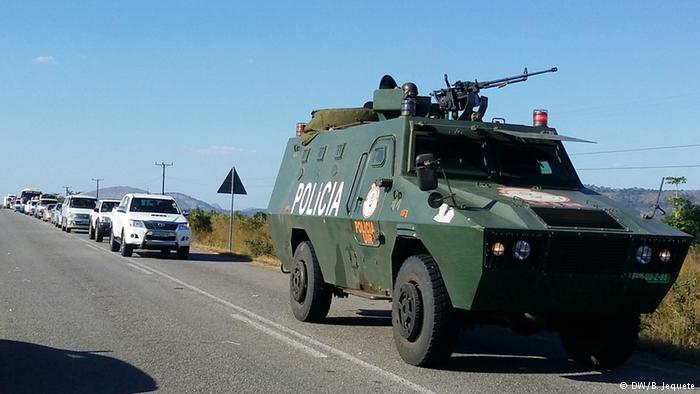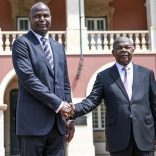Angola, Moçambique governments to sign five agreements
Changes in Mozambique state security leadership: What analysts say

DW (File photo) / Posts of General Command and Deputy Command of the Police of the Republic of Mozambique are currently vacant.
Two political analysts interviewed by DW Africa believe that the attack at Mocímboa da Praia and the need to accelerate the peace process have precipitated changes in the security services leadership.
President Filipe Nyusi of Mozambique has made changes in the military and state security apparatus leadership, dismissing Júlio dos Santos Jane from the General Command of the Police of the Republic (PRM) on Tuesday to appoint him Director General of the Information and Security Service (SISE), and dismissing the incumbent, General Lagos Lidimo, who had held that position since January.

Graça Tomás Chongo, Chief of the General Staff of the Armed Defence Forces, was also removed from his post.
The changes were announced via presidential statement, with no opportunity for questions from journalists and without indicating the reasons behind the changes.
“The president mentioned the need to accelerate change at a public medal-bestowing ceremony for military leaders,” political analyst Adelson Rafael suggests, ruling out any question that the dismissals were based on demands by Renamo, the opposition party in the peace process.
“No, Filipe Nyusi would not give in to such demands. But we must not forget that one of the issues under discussion at the negotiating table between the government and the Renamo party is the military issue. It is said that the Chief of General Staff was no longer in very good health. It may be that here we have a case of ‘joining the useful to the pleasant’,” he explains.
Three vacant positions
The dismissals leave three positions vacant: the Chief of the General Staff of the Armed Forces, the General Command of the Police of the Republic and the deputy command of PRM, after the death from illness last week of Deputy Commander Jose Weng San.
Despite Renamo’s demands to incorporate its cadres into the Armed Forces of Defence, Rafael discards the suggestion that Nyusi will get appoint someone from Renamo.
“The political context does not allow for anyone from Renamo [to be appointed], neither in the leadership nor to the deputy command. The president will continue to promote members of the Defence and Security Forces and will not look for someone from Renamo for the vacant posts,” he says.
The great surprise in the dismissals was the removal of General Lagos Dinimo from the General Directorate of the State Security and Information Service (SISE). Albino Forquilha, an analyst of political-military matters, points to the attack by an Islamist group in Mocímboa da Praia, which culminated in the death of two policemen and four civilians, as the tipping point.
“He may not have been very attentive to the issues that were happening or downplayed them. And it ended up the way it did. He might well have prevented [the attack]. His job was to put the state in a safer place through the information it collects. The population did furnish information and make signals. I think it was a mistake,” says the commentator.
Names close to Nyusi
For the now-vacant places, Albino Forquilha thinks that there will be no shortage of names close to Filipe Nyusi.
“As you know, our president was minister of defence and so has names much closer to him who can answer the challenges ahead,” he says. “I believe we have many cadres who can hold these posts and I think the head of state will have to appoint people to these posts soon, because they cannot remain vacant for very long,” he says.
Rafael agrees, adding that the president’s task is to find incumbents who will contribute to the peace process with Renamo.
“The interest is to go get consensual people to come and contribute. The [future] Chief of General Staff must be a consensual figure who also contributes to this process,” he concludes.












Leave a Reply
Be the First to Comment!
You must be logged in to post a comment.
You must be logged in to post a comment.